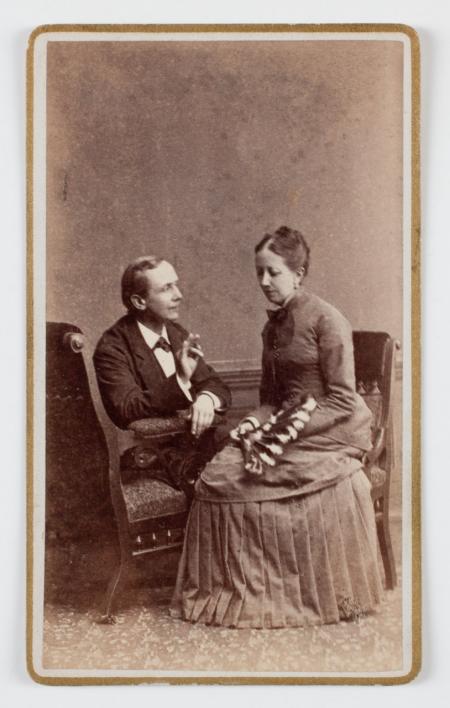
American Antiquarian Society
185 Salisbury Street
Worcester, MA 01609
United States
Led by Laurel Daen and Jennifer Van Horn
The 2024 Center for Historic American Visual Culture (CHAViC) summer seminar will focus on the visual and material cultures of disability in eighteenth and nineteenth-century North America. Participants will hone their skills in visual and material culture analysis, learn key methods and theories, including cripping, and gain experience working closely with archives and visual materials that support disability history. We will explore the unparalleled collections of the AAS, especially the library’s exemplary graphic arts collection of prints, photographs, and ephemera as well as collections materials on related topics such as education and printing for the blind.
The seminar will interrogate disability as lived experience, analytical category, and site for creativity and protest. Centering the histories of diverse peoples, we will explore topics such as enslavement, colonization, indigeneity, gender, education, warfare, and disability rights. Participants will actively work toward disability justice by attending to understudied and obscured histories, by questioning how we can use visual and material things to redress past injustices and dismantle ableism, and by considering equitable archival access.
Interdisciplinary in approach, the seminar welcomes scholars across multiple fields and areas of expertise that might include art history, Black studies, design history, disability studies, medical humanities, histories of vast early America, Native and Indigenous studies, and visual and material culture studies. Librarians, museum professionals, and public historians are encouraged to apply. No previous experience in disability studies or visual culture is required.
Guest faculty for the seminar include:
Jenifer Barclay, Associate Professor of History, University of Buffalo. She is the author of The Mark of Slavery: Disability, Race, and Gender in Antebellum America (University of Illinois Press, 2020) and is co-editor of a forthcoming collection entitled Cripping the Archive: Disability, History, and Power.
Erin Corrales-Diaz, Curator of American Art, Toledo Museum of Art. Prior to the Toledo Museum of Art, Corrales-Diaz was Assistant Curator of American Art at the Worcester Art Museum.
About
Participation is intended for college and university faculty as well as graduate students and museum professionals.
Accessibility
CHAViC is committed to creating an environment that welcomes all people and meets their access needs. The AAS library and classroom facilities are wheelchair accessible. Other accommodations may be available upon advance request. Participants can indicate accessibility needs in their applications.
Application
The deadline for applications is April 15, 2024.
Syllabus
The syllabus will be available in the Spring. Information on access to the readings will be emailed to admitted students.
Cost
Tuition for the seminar is $800, which includes lunch each day, light morning refreshments, and two evening meals. Modest funds to attend the seminar may be available to early career scholars.
Housing
The cost of housing is not included in the tuition fee.
Single dorm room housing will be available on the Worcester Polytechnic Institute campus (within easy walking distance of AAS) for approximately $68.00 per night.
Contact
For questions about the seminar, contact John J. Garcia, AAS director of scholarly programs and partnerships, at jgarcia [at] mwa.org (jgarcia[at]mwa[dot]org) or 508-471-2134.
Laurel Daen is an assistant professor of American Studies at the University of Notre Dame. Her research and teaching focus on disability, sickness, medicine, and health in America, primarily during the 18th and 19th centuries. She is currently completing her first book, which examines disability and civil rights around the time of the American Revolution. Daen’s work has also appeared in the Journal of Social History, Early American Literature, History Compass, and the Journal of the Early Republic. Her article in the latter publication focused on Martha Ann Honeywell won the Outstanding Article Award from the Disability History Association in 2018.
Jennifer Van Horn is Associate Professor at the University of Delaware, where she has a joint appointment in the departments of Art History and History. She is a specialist in the art of the United States and has published about objects of many sorts, including dressing tables, dentures, portraits, city views, gravestones, and embroidered samplers. Several of these appear in her first book, The Power of Objects in Eighteenth-Century British America, published in 2017 by the Omohundro Institute of Early American History and Culture. Her most recent book, Portraits of Resistance: Activating Art During Slavery (Yale University Press, 2022), locates enslaved Africans and African Americans on both sides of the painted canvas, as producers and viewers of portraits, and as destroyers and preservers of depictions. Together with Jaipreet Virdi and Sarah Wasserman she co-organized The Disability Gaze, a 2022 conference hosted by the University of Delaware’s Center for Material Culture Studies.